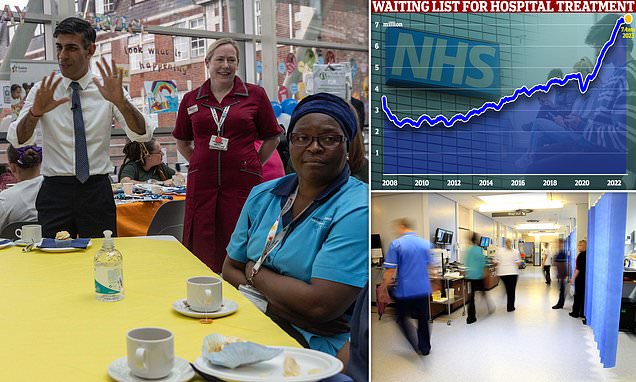NHS waiting list soars to 7.4million and will get worse, health minister Maria Caulfield is forced to admit
- The backlog in England is at its highest and currently at 7.4 million patients
- Health Secretary Steve Barclay claimed that the NHS needs only to evolve
A record waiting list for NHS treatment will continue to get worse, health minister Maria Caulfield admitted yesterday.
The backlog in England is currently at 7.4 million patients – about one in eight of the population.
That number, which is up from 6.8 million last July, is the highest since records began in August 2007. Rishi Sunak has made cutting the list one of his five pledges.
But Ms Caulfield says the number will climb even higher before it starts to come down. Her comments came as former PM Tony Blair called for private health firms to be allowed to offer services to patients through accounts on the NHS app, as part of ‘fundamental reform’ to the health service.
But Health Secretary Steve Barclay claimed the NHS needs only to evolve rather than have a drastic ‘big bang moment’.


Rishi Sunak during a visit to the Evelina Children’s ward at St Thomas’ hospital in central London, to take part in a NHS Big Tea celebration to mark the 75th anniversary of the NHS
Chancellor Jeremy Hunt, meanwhile, has said that the long-awaited NHS workforce plan should be ‘the first of many reforms’.
On the huge list of patients waiting for medical help, Miss Caulfield told Sky News: ‘We have always been very clear that after Covid, when routine procedures were shut down quite rightly to protect the focus on Covid, we always said the waiting list would go up before it would start to come down.’
This week, former health secretary Sajid Javid called for Britain to look to other countries for inspiration on the NHS, which do not rely solely on the taxpayer to fund their health services.
He is calling for a royal commission to examine the future of the health service.
Now, in the foreword to a report by the Tony Blair Institute, Mr Blair has thrown his weight behind major reform.
The Labour grandee says an NHS that is ‘essentially top-down and paternalistic’ does not work for modern people who are used to making their own choices and want to ‘control their own lives’.

The backlog in England is currently at 7.4 million patients – about one in eight of the population
Everyone should have their own ‘personal health account’, Mr Blair argues, delivered through the NHS app, which includes data from technology such as Fitbits – activity trackers that can be worn on the wrist like a watch.
In his plan for an overhaul, he states: ‘The patient will be able to receive, via the app, information about new services, including from accredited private providers, and suggestions to improve personal responsibility for individual health.’
Mr Barclay has defended the principles of the NHS, of being free to patients at the point of care, as ‘a source of national pride’ and he has been careful to manage expectations of an overhaul.
He told The Times: ‘Clearly there are pressures on services, particularly following the pandemic, and as a result of changing demographics and health needs.
‘It is important the NHS changes and adapts in response to this, and improving technology and medical advancements, but this requires constant evolution, not a big bang moment.’

Health Minister Maria Caulfield admitted yesterday that the record waiting list for NHS treatment will continue to get worse
But former health secretary Mr Hunt has backed calls for reform following the NHS Long Term Workforce Plan, under which more than 300,000 extra staff are set to be employed in England over the coming years.
Mr Javid, who called for an end to the ‘narrative of adulation’ around the NHS on BBC Radio 4’s World At One, is supported in his view by a number of think-tanks. Sebastian Rees of Reform said: ‘Sajid Javid is right to ask hard questions about how the NHS should be funded in the future… In Sweden, while most healthcare is funded from general taxation, patients are expected to pay small fees for care.’
Dr Kristian Niemietz, of the Institute of Economic Affairs, said: ‘Sajid Javid is right. A royal commission investigating the multiple and persistent failures of the NHS could be the first step towards meaningful system-level reform.’
Robert Colvile, of the Centre for Policy Studies, added that the NHS was ‘far behind the rest of the world in terms of linking pay to performance’.
Downing Street said Mr Sunak is committed to reducing waiting lists, focusing first on those who have waited the longest.
The Health Secretary is set to host an NHS Recovery Summit to boost attempts to cut waiting lists, which will focus on digital innovation and technology to help deliver better care.
Source: Read Full Article


